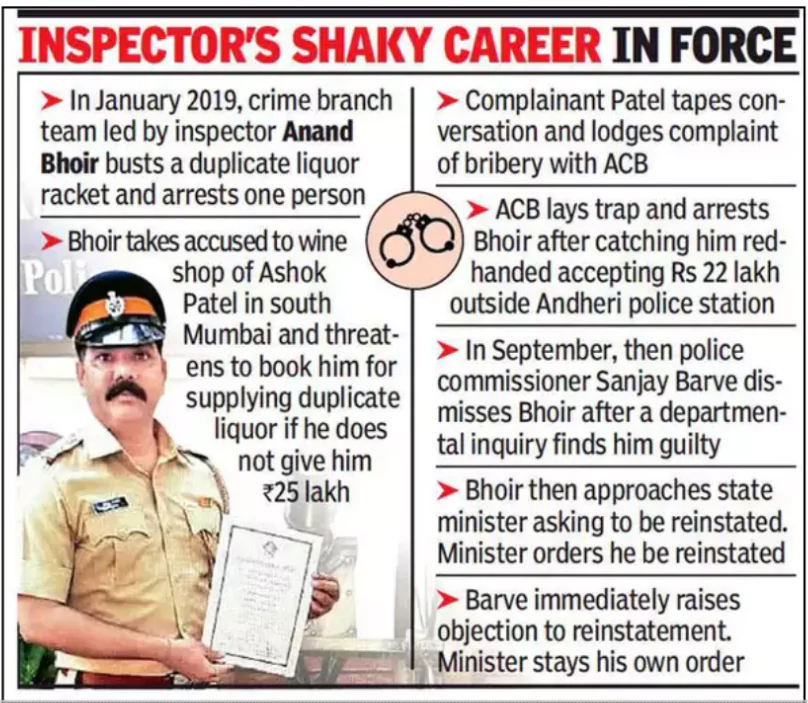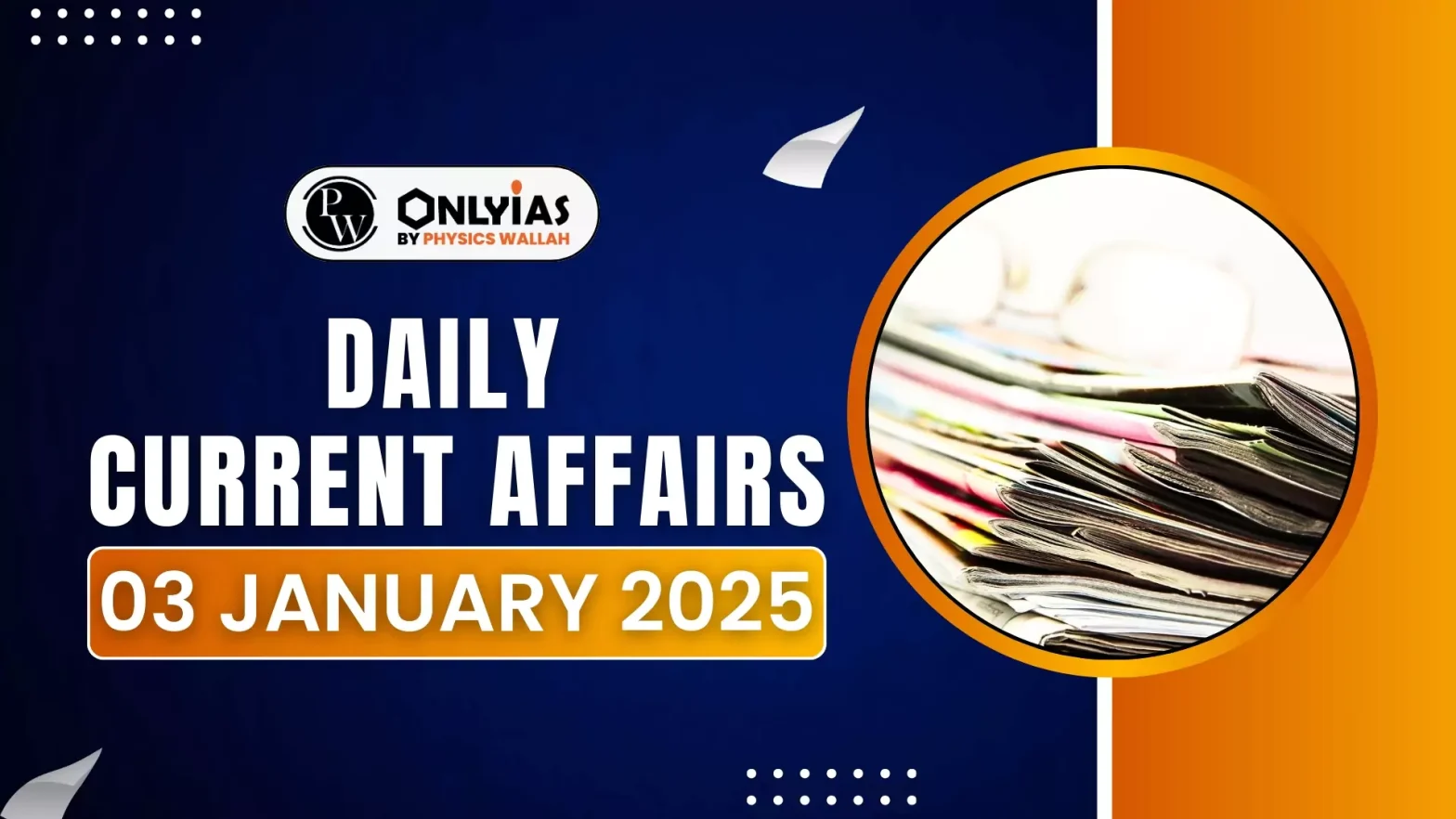In a case that could significantly impact corruption cases lodged before 2018, the Supreme Court is set to decide whether offering a bribe is punishable under the Prevention of Corruption Act, 1988 (PCA), even if the public official refuses the offer.
About the Case

- Issue: The issue in this case is whether offering a bribe (even if it is refused) is punishable under the PCA 1988, both before and after the 2018 amendments.
- The case involves a person, who in 2016 offered a Rs. 2 lakh bribe to a police officer in Orissa and was subsequently charged under Section 12 of the PCA.
- Main legal argument: Whether the mere act of offering a bribe constitutes “abetment” under the PCA before the 2018 amendment.
Enroll now for UPSC Online Course
About Bribery
- Bribery is the act of giving, offering, receiving, or soliciting something of value to influence actions of a public official or another person in charge of a public or legal duty.
- The Prevention of Corruption Act, 1988, specifically addresses bribery and corruption, with significant amendments in 2018 to include offering a bribe as a standalone offense.
- Pre-2018 PCA: Offering a bribe was not explicitly punishable unless it led to abetment under Sections 7 or 11 of PCA.
- Post-2018 PCA Amendment: Offering a bribe became a distinct and punishable offense, even if the bribe was not accepted.
Key Legal Provisions of PCA Related to Bribery
- Section 7: Punishes public officials accepting gratification other than legal remuneration in exchange for performing or refraining from performing official duties.
- Focuses on the demand and receipt of bribes by public officials.
- Section 11: Penalizes officials accepting valuable items related to their public functions without adequate consideration.
- Section 12: Punishes the abetment of offenses under Sections 7 and 11.
- Covers both successful and unsuccessful attempts to bribe.
- 2018 Amendment:
- Introduced provisions specifically criminalizing the act of offering a bribe, even if not accepted.
- Created the new offense of “bribing a public servant,” closing previous legal loopholes.
Judicial Views on Bribery
- Kishor Khachand Wadhwani v. The State Of Maharashtra (2019): The Bombay High Court held that before 2018, offering a bribe did not constitute an offence.
- The court stated that the 2018 amendment explicitly introduced the “offence relating to bribing a public servant.”
- Additionally, the court noted that an offence under Section 7 required a “demand” from the public servant.
- Ghanshyam Aggarwal v. The State (2020): The Madras High Court argued that offering a bribe alone was already punishable under Section 165A of the Indian Penal Code (IPC), which was replaced by the PCA.
- The court concluded that the mere act of offering a bribe constitutes a substantive offence and that the 2018 amendment merely clarified this position.
|
Check Out UPSC CSE Books From PW Store
Reasons Why People Bribe
- To Access Basic Services: People face institutional inefficiencies or deliberate delays, forcing them to pay bribes to access essential services like healthcare, education, or welfare benefits.
 A 2020 survey by Transparency International revealed that 39% of Indians reported paying bribes to access public services, including healthcare and education.
A 2020 survey by Transparency International revealed that 39% of Indians reported paying bribes to access public services, including healthcare and education.
- To Expedite Processes: Bureaucratic inefficiencies and red tape compel citizens to bribe officials to avoid prolonged delays in services like issuing licenses, registrations, or approvals.
- A 2024 survey by LocalCircles revealed that approximately 66% admitted to paying bribes to government officials in the past year to facilitate processes and avoid delays.
- To Avoid Harassment: Individuals bribe to escape harassment or undue obstacles created by officials, often under threat of legal or administrative action.
- A Transparency International survey (2020) revealed that 42% of Indians paid bribes to police officers to avoid fines or arrest.
- To Gain Undue Advantage: Individuals and businesses use bribes to secure unfair benefits, such as contracts, favorable decisions, or approvals.
- In October 2024, CBI arrested five CGST officials in Mumbai for allegedly demanding a ₹50 lakh bribe to settle a tax evasion case and prevent a businessman’s arrest.
- To Circumvent Regulations: Bribes are used to bypass legal or regulatory hurdles, often to secure illegal or unethical advantages.
- To Secure Employment: In competitive job markets, individuals are forced to pay bribes to secure employment or promotions.
- The Vyapam Scam (2013) involved bribery for government jobs and medical college admissions in Madhya Pradesh.
- To Protect Livelihoods: Small business owners and farmers bribe to avoid disruptions caused by local authorities or bureaucratic hurdles, ensuring continuity of their work.
- Farmers have reported paying bribes to access subsidies or loans, fearing denial of support if they resist.
| “Corruption comes from the never-ending greed. The fight for corruption-free ethical society will have to be fought against this greed and replace it with ‘what can I give’ spirit”. Dr. A.P.J. Abdul Kalam |
Ethical Implications of Bribery
- Undermines Integrity and Trust: Bribery erodes the integrity of public officials and institutions, leading to a loss of trust among citizens. It compromises ethical governance and creates skepticism about the fairness of public administration.
- The 2019 PDS Scam in Karnataka exposed officials diverting food meant for the poor into black markets, eroding trust in public welfare schemes.
- Encourages Corruption: Bribery fosters systemic corruption by normalizing unethical practices and reducing accountability.
- The Commonwealth Games Scam (2010) in India involved large-scale corruption, with bribes paid to officials and contractors inflating costs for infrastructure projects.
- Inequality and Unfair Practices: Bribery creates an unequal playing field, where those unable or unwilling to pay bribes are at a disadvantage.
- The 2018 Global Corruption Barometer revealed that 56% of Indians felt excluded from accessing services due to bribery demands.
- Erosion of Meritocracy: Decisions influenced by bribes undermine principles of meritocracy, leading to inefficiencies and a lack of competence in institutions.
- Recruitment scams, such as SSC paper leaks, replace meritorious candidates with those who pay bribes.
- Hampers Development: Bribery diverts public funds from development projects and welfare schemes into private pockets.
- The World Bank estimates that corruption costs developing countries $1.26 trillion annually, reducing resources for critical projects.
- Loss of Credibility: Bribery damages the credibility and reputation of public institutions, weakening citizens’ trust in governance.
- In November 2024, U.S. prosecutors charged Gautam Adani and associates in a $265 million bribery case, raising concerns over the Adani Group’s transparency and corporate governance.
- Moral Degradation: Bribery normalizes unethical behavior, causing moral degradation in society and weakening personal and organizational values of accountability and honesty.
- The normalization of bribes for school admissions in India fosters unethical behavior in future generations.
- Harm to Vulnerable Groups: Bribery disproportionately affects marginalized and vulnerable groups, limiting their access to basic services and opportunities.
- Rural families often pay bribes to access government schemes like MGNREGA, defeating the purpose of empowering the poor.
Check Out UPSC NCERT Textbooks From PW Store
Ethical Dilemmas in Bribery
An ethical dilemma arises in bribery when individuals are forced to choose between conflicting moral principles, often due to systemic pressures or personal circumstances.
- Integrity vs. Survival: A poor individual must decide whether to pay a bribe to access essential services like healthcare, education, or food rations.
- A farmer may face an ethical conflict in paying a bribe to secure a crop loan to avoid losing their livelihood.
- Upholding Ethics vs. Career Advancement: Employees may face pressure to pay or accept bribes to secure promotions, contracts, or job security.
- In the Vyapam Scam (2013), individuals faced ethical conflicts over paying bribes to secure government jobs.
- Loyalty to Organization vs. Public Welfare: Public officials might be asked to accept bribes to favor private entities, benefiting their organization but harming public interest.
- A civil servant approving substandard contracts due to political or organizational pressure.
- Breaking the Law vs. Solving Immediate Problems: Individuals may feel compelled to offer bribes to expedite delayed legal processes, like obtaining permits or licenses.
- A small business owner may bribe to speed up a clearance for their livelihood.
- Whistleblowing vs. Retaliation: Witnesses to bribery often face ethical conflicts between exposing corruption and fearing personal or professional retaliation.
- An employee may hesitate to report a superior demanding bribes, fearing job loss or harassment.
- Protecting Relationships vs. Reporting Corruption: Individuals might refrain from reporting bribery by friends, colleagues, or family members to avoid damaging personal or professional relationships.
- A contractor might avoid reporting a corrupt official they’ve worked with to maintain business ties.
Various Philosophical Perspectives on Corruption or Bribery
- Utilitarian Perspective: Actions are judged based on their outcomes. If bribery results in the greatest happiness for the greatest number, it may be seen as justified.
- Example: Paying a bribe to expedite life-saving medical treatment may align with utilitarian principles but undermines systemic equity.
- Deontological Perspective: Actions are inherently right or wrong, regardless of their consequences. Bribery is intrinsically unethical as it violates moral duties of honesty and fairness.
- Example: A government official refusing to take a bribe despite severe personal hardships exemplifies adherence to moral duty.
- Virtue Ethics: Focuses on the character and virtues of the individual. Bribery is seen as corrupting personal integrity and societal moral fabric.
- Example: An individual rejecting bribery reflects virtues like honesty, integrity, and justice.
- Social Contract Theory: Society operates on implicit agreements to uphold laws and fairness. Bribery breaches this social contract, weakening institutional trust.
- Example: Citizens paying bribes to access basic services illustrate the erosion of social contracts.
- Kantian Ethics: Actions must be universally applicable. Bribery cannot be universalized without leading to chaos, making it ethically unacceptable.
- Example: Kantian ethics would condemn bribery, even if it expedited critical disaster relief.
- Gandhian Perspective: Advocates for moral purity, truth, and non-violence in personal and public life. Bribery is inherently unethical as it violates the principle of truthfulness.
- Example: Gandhi’s emphasis on self-discipline and integrity highlights the moral degradation caused by bribery.
|
Suggestions for Curbing Bribery
- Strengthen Whistleblower Protection: Implement robust laws and mechanisms to protect individuals who report bribery from retaliation.
- Establish confidential reporting channels and provide legal safeguards for whistleblowers.
- Promote Transparency in Processes: Simplify bureaucratic procedures and reduce discretionary powers to minimize opportunities for bribery.
- Digitize public services like property registration or welfare schemes to ensure accountability and transparency.
- Encourage Ethical Leadership: Promote leaders who demonstrate integrity and discourage corrupt practices in organizations and institutions.
- Incorporate ethical leadership training in public administration and corporate governance programs.
- Strengthen Legal and Institutional Frameworks: Enforce stringent anti-corruption laws and ensure timely punishment for offenders to deter bribery.
- Fast-track corruption cases and impose penalties that include confiscation of illicit gains.
Check Out UPSC Modules From PW Store
United Nations Initiatives on Corruption and Bribery:
- The UN Declaration Against Corruption and Bribery in International Commercial Transactions (1996) encourages integrity in both public and private sectors.
- The International Code of Conduct for Public Officials (1996) provides guiding principles on loyalty, fairness, impartiality, and transparency.
- The UN Convention Against Corruption (2003) offers a legal instrument for asset recovery and combating corruption globally.
ADB-OECD Anti-Corruption Action Plan for Asia Pacific:
- Signed by India, this plan promotes regional cooperation in corruption prevention.
Global Networking:
- Encourages partnerships between governments, private sectors, and civil societies for anti-corruption efforts.
|
- Incorporate International Cooperation: Leverage global frameworks and partnerships to tackle corruption on a broader scale.
- Incorporate Ethics Education: Introduce ethics training in schools, colleges, and workplaces to foster a culture of honesty and accountability.
- Include real-world scenarios and ethical dilemma workshops to equip individuals with decision-making skills.
- Encourage Social Accountability: Empower communities to monitor public projects and report discrepancies through social audits.
- Use platforms like Right to Information (RTI) for public participation in governance.
- Foster a Culture of Zero Tolerance: Publicly recognize and reward ethical behavior in governance and corporate sectors.
- Awards for ethical public servants and corporate leaders who reject corrupt practices.
Enroll now for UPSC Online Classes
Conclusion
Bribery undermines trust, meritocracy, and ethical governance, perpetuating inequality and corruption. The Supreme Court’s pending decision on whether offering a bribe, even if refused, constitutes an offense under the pre-2018 PCA will clarify ambiguities in corruption laws, shaping the legal framework and enforcement against bribery in India.
![]() 3 Jan 2025
3 Jan 2025


 A 2020 survey by Transparency International revealed that 39% of Indians reported paying bribes to access public services, including healthcare and education.
A 2020 survey by Transparency International revealed that 39% of Indians reported paying bribes to access public services, including healthcare and education.